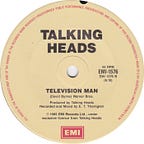SPOILER ALERT: CONTAINS MILD SPOILERS FOR BBC/HBO’s ‘INDUSTRY’.
In 1996–97, This Life’s portrayal of trainee lawyers sinking into, and variously screwing up, their careers and love lives in London’s trendier neighbourhoods, was a slow-burning hit that knew exactly when to stop. (We will ignore, for the sake of good taste the 2007, ‘reunion’ episodes).
As a similar age to the central characters, and also setting out on an abortive, corporate career, it felt to me more like a Gen X docu-drama than a pure work of fiction. And while some of the sexier and druggier storylines left me wondering what I might be missing out on, I always understood what the characters were getting themselves into.
A generation later, HBO, the BBC and Lena Dunham have taken the This Life template and cast it over the same locations (no further west than Notting Hill, no more north than Finsbury Park) and applied it to four graduate schemers in a financial services giant.
The result is Industry, which finished its terrestrial run last night, and is definitely not for the faint-hearted.
I know now I’m getting old when I can understand the various hedges and other instruments our wannabe Masters of the Universe are betting on, but much of the rest remains a mystery. Do millennials not have actual sexual intercourse anymore? Bodily fluids and home-made pornography are swapped as enthusiastically as credit defaults but without much actual full-points doinking taking place. The main release is some very enthusiastic investment of wrist capital, mutual and solo, at home and in the office. In one locker room scene during a Christmas party, the City of London all but ends up getting renamed the Squirt Mile.
A variety of pills, powders and liquids that would baffle even Walter White disappear into throats, veins, noses and, on one occasion, a rectum. All washed down or flushed out with heroic amounts of alcohol on the ensuing “sesh”.
In between the drink, drugs and merchant banking, our four heroes and their colleagues find time for some merchant banking. The writers, two ex-bankers, capture the style of high finance’s atmosphere and technicality very well. The best bits of dialogue are the half-heard boasts and banter, and the jargon-heavy yelps, floating around just over the main exchanges.
In the portrayal of early working life, Industry excels. The tension and guilt of taking on tasks that you’re not qualified for. The pressure of delivering and never saying no. The failures to balance professionalism and friendship. The bullying, the demeaning gofering, and the impatience at getting a chance to do something important.
I never worked in anything as high-stakes or high-powered as banking but flashbacks to psychotic bosses and sociopathic colleagues flooded in.
All this is overlaid with the characters’ personal conflicts. Families are only fleetingly involved in our Industrialists’ lives so the bank becomes in loco parentis as the protagonists compete to make the cut at the annual RiF (Reduction in Force). Line managers become the focus of both Oedipal and siblingesque rivalries.
American Harper is the most talented with the most to lose; and, as we find, the most deft at the internal politics.
Working-class Rob finds a father figure in old-school Clement who hides his Scottish roots with Received Pronunciation, and takes his FT by paper and his drugs by needle.
Multi-lingual, privately-schooled, plasticky Yas fits in best with the super-wealthy atmosphere, but worst with the sexist, drunken sub-culture.
Eton-educated Gus grieves the fatal loss of his desk-mate and the emotional strain of his closeted lover, and masks it all with increasing cynicism about the job.
These motifs are finally compressed into a few minutes by the RiF interviews. Harper gets emotional but knows she’s done enough. Rob relies on boyish charm over financial knowledge. Yas blusters. Gus simply gives up.
Are any of them, at any point, a particularly sympathetic presence? Would you really want to spend any time with these self-promoting chancers? Could you really keep up with the ego-fuelled passing around of drugs and each others’ genitals? Or is it just, as I say, that you and I are old? This Life broke a fair few barriers in terms of TV’s portrayal of sex and drugs and youthful, selfish arrogance. Yet I still would have happily answered an ad for a spare room in the house with Milly, Anna, Egg, Miles and Warren. I guess Yas and Harper’s Kensington garden flat (with its immaculately trimmed bushes) and Rob and Gus’s Islington conversion would have been just as tempting. This Life was that life, and Industry is their life. So good luck to them for next year’s second series.
All eight episodes of Industry are streaming now on iPlayer.
